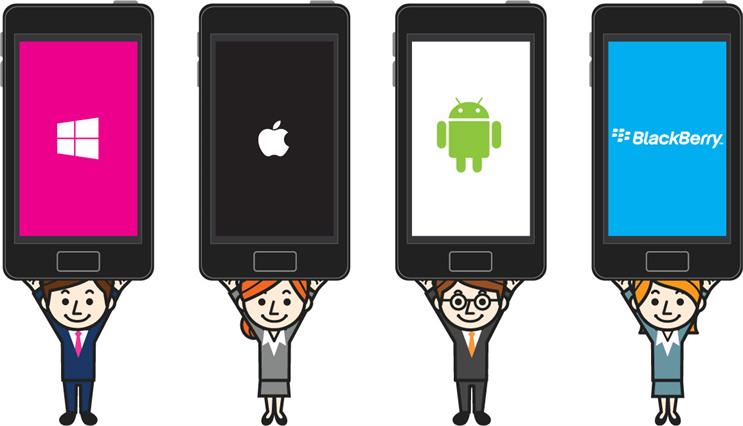
Which company will win the battle for smartphone dominance in 2014? The latest data, released last month, showed Apple leading in the US (42% share), with Samsung ahead in the UK (58% share) and, indeed, most other markets. Others (notably Microsoft and BlackBerry) are struggling to get a look-in.
Why do we talk about the battle for "dominance" in smartphones? In most industries - cars, financial services, soap powders - we expect to see large numbers of competing companies, often with quite similar market shares. But in the high-tech world, it is quite normal for one company to completely dominate - think of Intel in microprocessors, Cisco in routers or Microsoft in personal- computing software.
These high-tech markets have three distinctive features that allow the strong to get stronger. First, they are characterised by what economists call network effects - the idea that something becomes more valuable when more people use it.
Exponential growth
Take, for example, the exponential growth of Facebook, which became more attractive as more people signed up. It's the same with developers - they all want to put their apps on the iTunes Store because it has the most users, which in turn helps it to attract more users.
Second, there are significant switching costs between products, and customers get locked in. If I want to trade in my Dell laptop for an Apple machine, I can expect many days of grief as I get used to the subtle differences between the two operating systems. If I want to change my soap powder, or even buy a different make of car, the costs of switching are much lower.
If I want to change my soap powder, or even buy a different make of car, the costs of switching are much lower.
Third, the value in high-tech products is mostly in the software, and the great thing about software is that the variable cost of making it is zero. So, once Apple has developed its new operating system, it has an incentive to get it into as many people's hands as possible: whatever they pay goes straight to the bottom line.
Put these three points together, and it's easy to see how some markets end up being completely dominated by one company, with the strong getting stronger and the marginal players being elbowed aside. Moreover, it isn't necessarily the "best" product that wins in this world: VHS pushed out Betamax in the videotape market, and Microsoft dominated Apple in PC operating systems; both cases where, arguably, the inferior product won out.
All of this helps to explain the strategies we see the smartphone companies using to gain control of their market. The operating system (Android, iOS, Windows) is the heart of the product, so to attract more users to their system they are building "ecosystems" of suppliers, app developers and mobile operators around it. They are also seeking to control their channels to secure their market share - hence Microsoft's acquisition of Nokia.
Switching costs
So what will happen to the smartphone industry in 2014? There is no way back for BlackBerry or other lesser operating systems, such as Symbian. However, in terms of overall winners, history doesn't tend to repeat itself exactly. The switching costs between smartphone operating systems are falling, so we may end up with two or three players co-existing.
There is also another lesson from the PC industry that we shouldn't forget, namely that the "open" architecture created by Microsoft, Intel and IBM ultimately attracted more followers than the "closed" system of Apple.
So, here is my prediction: the Android operating system will continue to grow (through Symbian, LG, HTC and Motorola), because increasingly it does everything Apple can do, and at a lower cost to users and app developers. Apple will retain a loyal, but gradually dwindling, customer base - it will continue to be cool, but its best days are behind it. And what about Microsoft? Just as it did with the Xbox, I expect it to continue to throw money at the problem, gradually building up sufficient market share to become a profitable third player.
High-tech markets like smartphones don't follow the traditional rules of competition - they operate according to the logic of "increasing returns" to scale, where the strong get stronger. By understanding these different rules, you can make much better sense of the strategies of Apple, Google, Microsoft and the like.



.jpg)
.jpeg)
